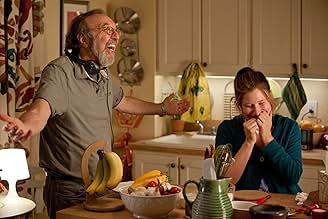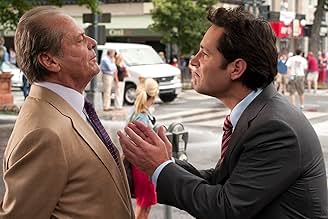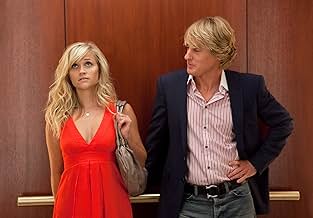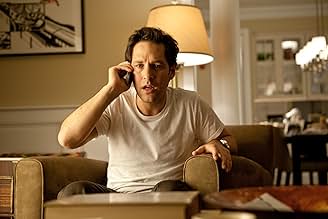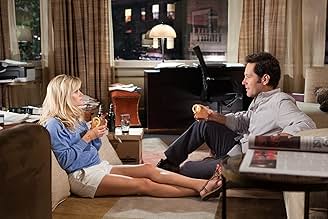NOTE IMDb
5,4/10
56 k
MA NOTE
Exclue de l'équipe de softball des États-Unis et ne se sentant plus toute jeune, Lisa se pose des questions sur sa vie et se retrouve au milieu d'un triangle amoureux entre un homme d'affair... Tout lireExclue de l'équipe de softball des États-Unis et ne se sentant plus toute jeune, Lisa se pose des questions sur sa vie et se retrouve au milieu d'un triangle amoureux entre un homme d'affaires et son petit ami actuel.Exclue de l'équipe de softball des États-Unis et ne se sentant plus toute jeune, Lisa se pose des questions sur sa vie et se retrouve au milieu d'un triangle amoureux entre un homme d'affaires et son petit ami actuel.
- Réalisation
- Scénario
- Casting principal
- Récompenses
- 3 nominations au total
Avis à la une
Some filmmakers you just fall into. The ones I hold most dear are those that are both expert cinematic storytellers and attempt to reshape me. These are rare, but there is a second tier of cinematic storytellers; although they do not work at deep levels, you just get captured by the mastery of the storytelling. Brooks is one of these. He is a master and even his disaster in 1994 was interesting.
This film did poorly in the US. I think it was not zany enough, short enough or abstracted from reality enough for the audience who is attracted to the form. Perhaps if it is judged as mere candy, it fails. But I found it well met the requirements on which the genre was founded: the alternating of charm in the nature of humans with humor about many of the same traits. This engagement-detachment by humor is perhaps the oldest storytelling device after the technique of omission, and Brooks is delicate if old-fashioned.
The story is that he is valued in the business for adding texture of these two qualities: humor and endearment. But he gets stuck in creating scenes that are no longer than a few minutes, because that is what the market pulls. He gets paid extremely well for guiding "The Simpsons," basically two jokes per show, and also as uncredited script doctor on a scene by scene basis. He hates this, he has said and when he can find the space for a long form project, he does it as if his soul is in the balance.
He doesn't start with characters weaving a story, or even a story proper. He is all about situations and how people react within them as they try to gain control. Our two main characters here, destined for love, are struggling less with the lives they are given than the techniques they had been using until that point to cope. The weapons in forming the new situations we desire then to get, are words. And such words in dialog that is so perfect we don't deserve the simply by paying 8 bucks.
Brooks is a writer, but it is clear that every line is written within a specific cinematic vision. Some of the shots here are quite unconventional, the composition and rhythm of shots is very personal and the flow of the words absolutely matches or is counterpointed to that rhythm. Watch the motions of the camera and the dialog when Lisa is first in George's apartment. This is effective and idiosyncratic to Brooks. It worked for me because these films are all about deferred gratification and he is serious about pushing it.
In little things, it works. Witherspoon's lack of sex appeal is handled by making her a tough jock. The formula demands — absolutely demands — that the guy profess his love at the end in front of an audience representing us. We know he is going to her birthday party to do just this, but he does not. Instead Brooks has placed a clever scene before this, a radically unconventional one that works when paired with what happens after the party, observed by no one but us and Nicholsen's character. In this scene — possibly the first written — has the two to-be lovers filming an awkward proposal, and then engaging in a re-enactment in a folded engagement. It satisfies the formula without following it.
There are several folds along these lines, highly structured and effective.
Ted's Evaluation -- 3 of 3: Worth watching.
This film did poorly in the US. I think it was not zany enough, short enough or abstracted from reality enough for the audience who is attracted to the form. Perhaps if it is judged as mere candy, it fails. But I found it well met the requirements on which the genre was founded: the alternating of charm in the nature of humans with humor about many of the same traits. This engagement-detachment by humor is perhaps the oldest storytelling device after the technique of omission, and Brooks is delicate if old-fashioned.
The story is that he is valued in the business for adding texture of these two qualities: humor and endearment. But he gets stuck in creating scenes that are no longer than a few minutes, because that is what the market pulls. He gets paid extremely well for guiding "The Simpsons," basically two jokes per show, and also as uncredited script doctor on a scene by scene basis. He hates this, he has said and when he can find the space for a long form project, he does it as if his soul is in the balance.
He doesn't start with characters weaving a story, or even a story proper. He is all about situations and how people react within them as they try to gain control. Our two main characters here, destined for love, are struggling less with the lives they are given than the techniques they had been using until that point to cope. The weapons in forming the new situations we desire then to get, are words. And such words in dialog that is so perfect we don't deserve the simply by paying 8 bucks.
Brooks is a writer, but it is clear that every line is written within a specific cinematic vision. Some of the shots here are quite unconventional, the composition and rhythm of shots is very personal and the flow of the words absolutely matches or is counterpointed to that rhythm. Watch the motions of the camera and the dialog when Lisa is first in George's apartment. This is effective and idiosyncratic to Brooks. It worked for me because these films are all about deferred gratification and he is serious about pushing it.
In little things, it works. Witherspoon's lack of sex appeal is handled by making her a tough jock. The formula demands — absolutely demands — that the guy profess his love at the end in front of an audience representing us. We know he is going to her birthday party to do just this, but he does not. Instead Brooks has placed a clever scene before this, a radically unconventional one that works when paired with what happens after the party, observed by no one but us and Nicholsen's character. In this scene — possibly the first written — has the two to-be lovers filming an awkward proposal, and then engaging in a re-enactment in a folded engagement. It satisfies the formula without following it.
There are several folds along these lines, highly structured and effective.
Ted's Evaluation -- 3 of 3: Worth watching.
It's almost unfathomable that this movie stinks...but it does, sadly. Confused characters bumbling through scenes, awful development of backstory, no chemistry, hardly any laughs and just a mishmash of WTF-ery :(
It has great cast but unfortunately, there's one very weak script. It's an example for having such a great cast as this one but unfortunately, it was misused.
By the way, that's a fine work by Janusz Kaminski the cinematographer.
By the way, that's a fine work by Janusz Kaminski the cinematographer.
I was expecting to be very disappointed with this film because I'd heard that most people disliked it. I really really liked it. I think that audiences these days have to have a joke every 30 seconds to be entertained. Maybe audiences feel short changed if there isn't a huge obvious wrap up off the plot at the end of the film. I liked that everything wasn't black and white in the film. There are many unanswered questions. The characters' intentions and feelings weren't absolutely clear. That's what I loved about it.
It's sad that so many people disliked this film, but I think it's very courageous of James l. Brooks to write a film that pleased him and not have to pace it like most other "successful" Hollywood crap movies. This film makes you think unlike many other huge hit comedies these days.
It's sad that so many people disliked this film, but I think it's very courageous of James l. Brooks to write a film that pleased him and not have to pace it like most other "successful" Hollywood crap movies. This film makes you think unlike many other huge hit comedies these days.
Okay, so call me crazy, but I would NEVER give a movie a one star rating unless it was absolutely miserable. Like if I would rather leave the theater and the $10 I spent on it than watch it. How Do You Know was not a one star movie. The only problems I saw with it were that it was a little long. I thought they could have cut some scenes out and not only gotten away with it, but made it a more enjoyable experience. Also, with actors like Paul Rudd and Owen Wilson (plus how it was advertised as a comedy) I was expecting to do a lot more laughing in the movie than I really did. Don't get me wrong, it was funny, but not as much as you'd expect. I think if you go to this movie knowing it's more of a romantic comedy than a typical Owen Wilson/Paul Rudd style comedy then you'll be pleasantly surprised. I really enjoyed the movie, I thought it was very clever and surprisingly uplifting and I thought it was definitely worth the money.
Le saviez-vous
- AnecdotesOne of the lesser known "big box-office bombs of all time"; the budget spiraled up to $120 million due to high salary demands of its principal cast and director (around $50 million), a lengthy production, as well as a costly re-shoot for the beginning and the ending. Coupled with marketing costs, the movie lost an estimated $105 million.
- GaffesAfter their first night together, Lisa is seen wearing a red camisole that has straps showing after putting on her red dress from the night before. The straps didn't show during their date and after she got home.
- ConnexionsFeatured in The Tonight Show with Jay Leno: Épisode #19.58 (2010)
- Bandes originalesWhat Is It This Time?
Written by Jamie Lidell (as Jamie Lidderdale) and Mocky (as Dominic Salole)
Performed by Jamie Lidell
Courtesy of Warp Records
By Arrangement with Zync Music
Meilleurs choix
Connectez-vous pour évaluer et suivre la liste de favoris afin de recevoir des recommandations personnalisées
- How long is How Do You Know?Alimenté par Alexa
- What does the title mean?
Détails
- Date de sortie
- Pays d’origine
- Site officiel
- Langue
- Aussi connu sous le nom de
- ¿Cómo saber si es amor?
- Lieux de tournage
- Sociétés de production
- Voir plus de crédits d'entreprise sur IMDbPro
Box-office
- Budget
- 120 000 000 $US (estimé)
- Montant brut aux États-Unis et au Canada
- 30 212 620 $US
- Week-end de sortie aux États-Unis et au Canada
- 7 484 696 $US
- 19 déc. 2010
- Montant brut mondial
- 48 668 907 $US
- Durée2 heures 1 minute
- Couleur
- Mixage
- Rapport de forme
- 1.85 : 1
Contribuer à cette page
Suggérer une modification ou ajouter du contenu manquant








